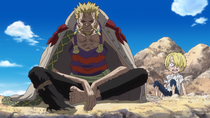Hey everybody. This post is primarily about the process of drafting 'good' characterS. The reason why I highlight the last letter is because a good character is really only good when even when not shown to do something, you'd understand how'd they react, or be surprised if they reacted in another way. So I'm drafting the 'cast' for an RPG plot I plan on at least doing the story conceptualization for and I was wondering if anybody could contribute some feedback on the little blips of characters I will be supplying below.
Before I do post though- I learned a lot about character designing from this website: http://www.celebritytypes.com/
They helped me discover 'archetypical' personality patterns for developing characters. "In the absence of life experience how would a given person act?". At any rate, if you're developing good characters I recommend you check it out.
I'll try to keep the information about each character to a minimum. I just want to know whether or not they are constructed well relative to each other, or if the band of folks seems somehow... Unstable.
At any rate:
Party Members
Protagonist: In his 20s. Intelligent and a former aspiring academic who quit when he realized that he could be doing more at this point in time by taking action into his own hands. A half-elf but has had his ears convincingly surgically altered. His elven family is renowned for having 'revolutionary' impulses despite the fact that all elves care not about any conventions or human traditions. His development revolves in part around his family, in part around his raison d'etre. He has the inborn desire to change things- but is countered by an enemy who believes all change reduces to a single moment in all history.
Protagonist's initial partner: A woman in her early 30s. Leader of the mercenary squad the protagonist finds himself a part of. Cynical, atheistic, and witty (see the ENTP page on celebritytypes). She has a pedagogical streak and is good to the core- but not unwilling to kill. Does not believe in the efficacy of academic work but would actually be really good at it if she tried. Her development comes in the form of finding 'a cause' to take seriously. She becomes a highly beautiful personality under those conditions and she complements the other protagonist well.
Prince character: A tightly wound, quiet, austere fellow in his 20s (See the INTJ type on celebritytypes). A member of a noble family in a far off country- think of the Ottoman Empire. He wants power so that he can effect the change he desires but the political situation there is not ripe. Comes to the country to enlist aid in taking the throne. He has all the makings of a good ruler but one- that he wants and lusts for the power. His youth belies a wisdom, but his arrogance in that wisdom blinds him to some of the essential realities that being a ruler involve.
His development involves combatting somebody with even more credentials than he has- would it be wrong to deprive the land of that candidate just so he could rule?
Female Aristocrat: An 18-year old who is young but eager. Growing up in a protected environment, she yearns for freedom but is afraid of those first baby steps into the real world. When she gets her chance to go 'out there' with the party she does so, but secretly holds reservations that are quite normal. She loses much in the course of the game which is where her development mostly takes place.
Cleric: A highly developed intellect rests in the heart of this 40-year old who detests the fact he has a good brain. He embraces the orthodoxy of the main religious instutition with zeal- but also has a good eye for assisting the unfortunate. The ideal religious man who is plagued with doubts and self-flagellation. Development occurs in line with main protagonists because both hail from at least one extremely intelligent parent.
A half-dragon traveller: A woman who is roughly 1,000 years old (like in Fire Emblem Awakening but with lore-related differences of course). She is experienced yet always eager to learn new things. Tough under stress and good at pulling through difficulty. Very loyal to her mother (the dragon) who also yet lives. Her father is one of the central antagonists of the game and she is the one that ends up killing him. As an aside, the mother also helps in the fight, cutting off her 'husband's' arm (is this too star wars?)
A Bard: A rather colorful character with tons of humorous asides that he claims 'Escape his mouth like an inmate from an unlocked cell". Ridiculously entertaining and at times sentimental. He can be goofy but also possesses a sapient insight (see celebritytypes ENFP). Well-read, so some of the exploits of the villainous parties are known to him (for they are all storied heroes of the past). Development comes in the fact that he slowly becomes a very kind character to the party who holds them together in good spirits. You find that it's stressful for him though because of his own reservations about fighting storied people and seeing the world as it is.
Historian: An important character who is also older, 40s. A professor at the central academic establishement of the country, he is also a rather intrepid explorer (a bit like Indiana Jones but with much less overt machismo). Has a large historical knowledge base, so like the bard (even more so really) he is the one doing a lot of the 'piecing together' of much of the game's plot. His development comes in the fact that his entire field of study is basically defused by the course of the game's plot. How would he cope when his entire life's work is already done?
A Communist ideologue (of sorts): In a foreign kingdom, he is one of the masterminds behind the current communist organization in a republic in another country. He holds very different values to much of the party but is smart enough to know that aggravating certain people is not the most fruitful enterprise. The trouble for him comes in the fact that a main villain who ostensibly would not do something the revolutionary wants actually does- which forces this communist dude to reflect on what it is that he wants- which results in him joining you. Another party member from the official government joins as well- and they hit it off to a rocky start.
____________
My current problem is that it seems too many of the characters are 'smart'. I feel like I need to diversify it with characters who *don't* care or don't understand what's going on. But doing that without making it obvious is a challenge in designing the cast. The current list is subject to revision as well.







